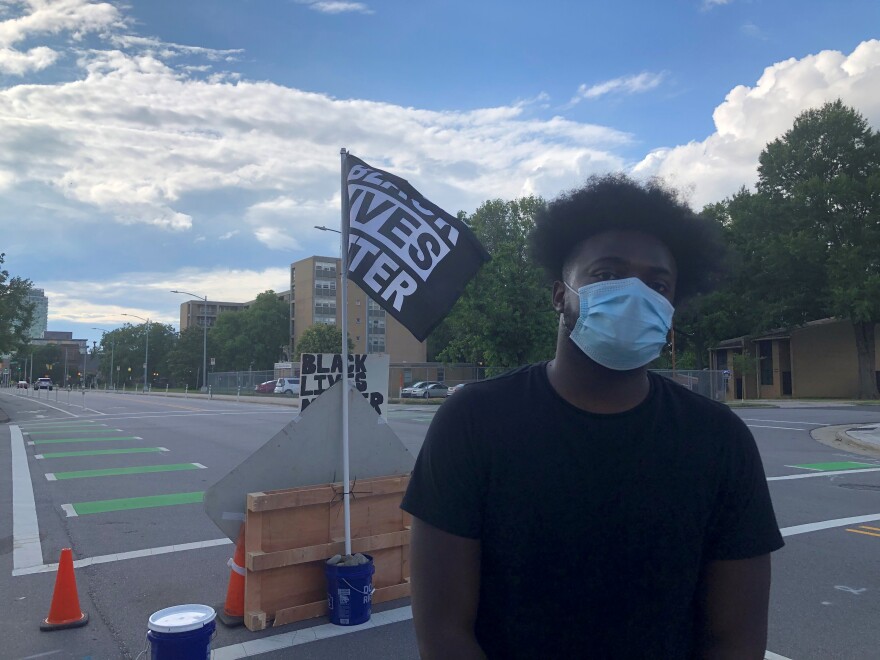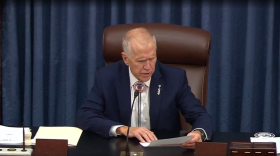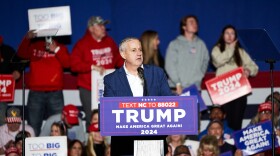North Carolina is just one of five states this year with concurrent races for the presidency, U.S. Senate and the governorship. Protesters demanding police reform and racial justice, and the pandemic from the coronavirus, could impact how these elections turn out.
North Carolina Central University political science professor Jarvis Hall hasn't seen such widespread civic unrest coincide with a major election in more than 50 years.
"Other than '68, I don't know if we've had this kind of participation in the streets prior to a presidential election," said Hall.
1968 was a year of social and political upheaval: The assassinations of Martin Luther King, Jr. and Robert F. Kennedy, followed that summer by scenes of Chicago police beating protesters outside the Democratic National Convention.
Now, since the May 25th killing of George Floyd by a white Minneapolis police officer, people have taken to the streets of American cities — including Charlotte, Raleigh and Durham — demanding racial justice.
"We're going to see these things leading up the elections," Hall added. "It's not just a long, hot summer, I think going into fall you're going to see more mass participation."
Election Day is just 18 weeks away, and North Carolina is just one of five states this year with concurrent races for the presidency, U.S. Senate and the governorship.
In addition to the public clamor for reform, candidates must adapt to the realities of campaigning amid the coronavirus pandemic. That means fewer close contact events, or what longtime Republican political consultant Paul Shumaker calls "grip and grins.” Shumaker's working with U.S. Sen. Thom Tillis, who's running for reelection against Democratic challenger Cal Cunningham.
"We had a very heavy door-to-door program," said Shumaker. "In less than a 24-hour period of time we shifted to a phone-based program."
Campaign Cash Still Flows
The tactics of this election have changed but Shumaker said 2020 remains unchanged in one key aspect: big-time spending.
In the Tillis-Cunningham race, Shumaker says $98 million has already been committed to ads for the June to November period, mostly by outside groups, and that will only increase.
"Same thing in the governor's race," said Shumaker, who is not working on that specific campaign battle. "I think Governor Cooper has put in a seven-plus million dollar media buy."
At this point, Gov. Roy Cooper enjoys an advantage over his Republican challenger, Lt. Gov. Dan Forest. Cooper is better known and has been omnipresent on TV, directing the state's response to the coronavirus.
That response includes his phased-in approach to easing public health restrictions — allowing restaurants to operate at reduced capacity, for example, but keeping gyms and bars closed. And that policy hasn't hurt Cooper's approval rating, according to Meredith College poll director David McLennan who explains Cooper stands at “up to 60-plus percent” approval rating with low disapproval rates.
Forest has mostly heckled from the sidelines, painting Cooper's plan for reopening the economy as arbitrary and unfair to small businesses.
After protesters tore down Confederate monuments in Raleigh this weekend, the governor castigated a Republican-backed law from 2015 that restricted the removal of what he called "painful memorials."
Forest issued a statement attacking Cooper for abiding lawlessness.
Between now and November, issues like the reopening of schools and soaring unemployment could create more voter frustration for Forest to tap into. And races in this battleground state will likely come down to a sliver of truly unaffiliated swing voters.

Protesters At The Polls
For Raheem Williams, any candidate who hopes to win this fall must listen to him and his fellow protesters. Williams was part of a group that set up an encampment outside the Durham Police Department headquarters last week, after the city council voted to increase police funding by 5%. That's money Williams said could be better spent on helping the community.
"A LGBTQ community center," Williams suggested. "A grant so that if we do want to have a Black grocery store in the food desert that is East Durham, somebody will be able to do that."
Williams said he and his fellow demonstrators plan on changing America and will vote this fall.









